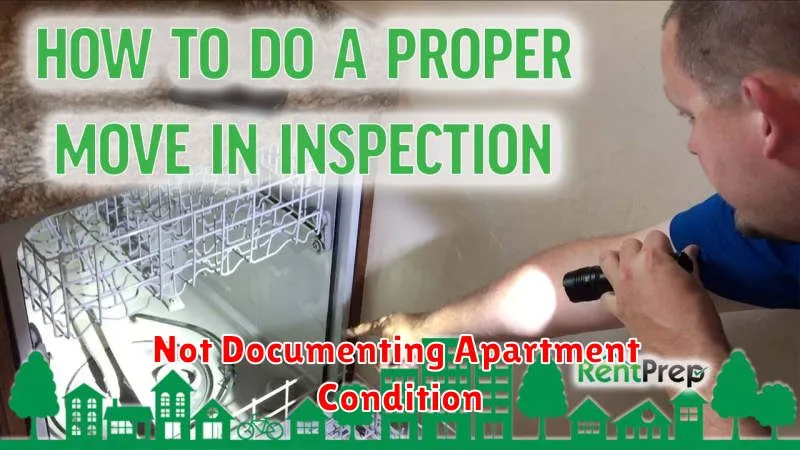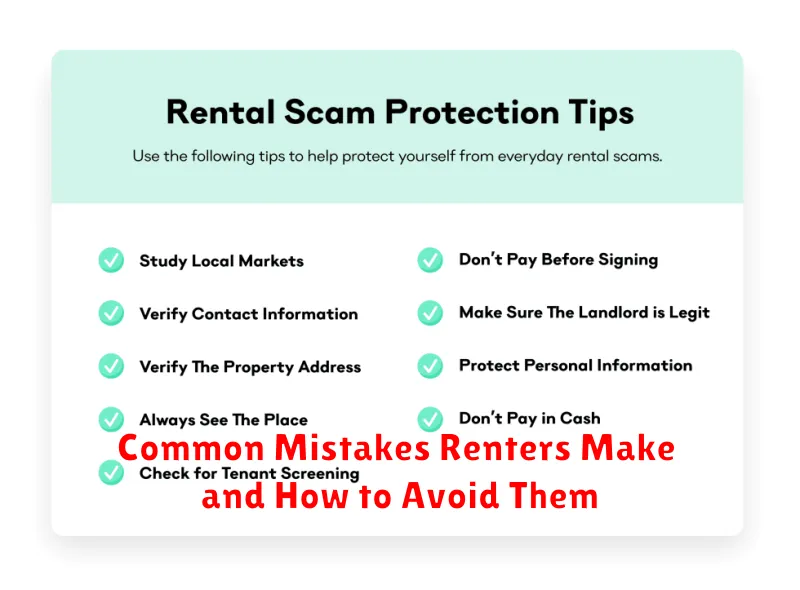Renting a property can be an exciting yet complex process. Many first-time renters, and even seasoned tenants, often make common mistakes that can lead to unnecessary stress, financial burdens, and even legal disputes. This article addresses the most common mistakes renters make, providing valuable insights and actionable advice on how to avoid them. Understanding these pitfalls will empower you to navigate the rental process with confidence and ensure a positive renting experience.
From neglecting to thoroughly read the lease agreement to overlooking crucial aspects of property inspections, this guide will cover a wide range of common renter mistakes. Learn how to avoid issues with security deposits, maintenance requests, and landlord communication. By understanding your rights and responsibilities as a renter and proactively addressing potential problems, you can create a more harmonious and successful tenancy. This comprehensive guide will help you avoid these common pitfalls and enjoy a stress-free renting experience.
Not Reading the Lease Carefully
One of the most common and costly mistakes renters make is not thoroughly reading their lease agreement before signing. A lease is a legally binding contract, and failing to understand its terms can lead to unexpected expenses, disputes with the landlord, and even eviction. It’s crucial to take the time to carefully review every clause, including details about rent payments, late fees, maintenance responsibilities, pet policies, and the length of the tenancy. Don’t hesitate to ask for clarification on anything you don’t understand before signing.
Key areas to pay close attention to include the terms of the security deposit, procedures for requesting repairs, and any restrictions on subletting or having guests. Understanding these details upfront can help avoid misunderstandings and potential conflicts down the road. Consider having a lawyer review the lease if you are unsure about any of the language or provisions. It’s a small investment that can save significant headaches later.
Remember, once you sign the lease, you are agreeing to abide by its terms. Ignorance is not a defense. Protecting yourself starts with a comprehensive understanding of your rights and responsibilities as outlined in the lease agreement. Take the time to read it carefully, ask questions, and ensure you’re comfortable with every aspect before committing.
Ignoring Hidden Costs

Failing to account for hidden costs can severely impact any project, whether personal or professional. These costs are often not immediately apparent and can significantly inflate the overall budget or timeline. Thorough planning and research are essential to identify potential hidden expenses. Examples include permit fees, inspection costs, storage fees, and potential cost overruns due to unforeseen circumstances.
In business, hidden costs can arise from various sources. Administrative expenses, such as software subscriptions or office supplies, are frequently overlooked. Training costs for new employees or for new software implementation can also add up. Similarly, maintenance and repair costs for equipment or facilities are easily forgotten during initial budget planning. Ignoring these expenses can lead to budget deficits and compromised project success.
Mitigating the impact of hidden costs involves proactive identification and management. Conducting a thorough risk assessment, consulting with experts, and building contingency buffers into the budget are crucial steps. Regular monitoring and tracking of expenses throughout the project lifecycle allows for timely adjustments and prevents unpleasant surprises down the line. By addressing potential hidden costs proactively, you can ensure the successful completion of your endeavors within the allocated budget and timeline.
Not Documenting Apartment Condition

Failing to document the condition of your apartment at move-in and move-out can lead to disputes with your landlord regarding security deposit deductions. A thorough record, including photos and videos, serves as crucial evidence of the apartment’s pre-existing condition and protects you from being held responsible for damages you didn’t cause. This documentation should encompass everything from minor wall scuffs to major appliance malfunctions.
Upon move-in, promptly document any existing damage and submit it to your landlord. This protects you from being charged for those damages later. Similarly, when moving out, document the apartment’s condition to demonstrate you left it in acceptable condition, reasonable wear and tear excepted. This documentation can be invaluable in resolving any disagreements over the return of your security deposit. Keep copies of all communication with your landlord regarding the condition of the apartment.
By proactively documenting the condition of your apartment, you are taking a significant step towards protecting your rights as a tenant and ensuring a smooth move-out process. This simple act can save you time, money, and stress in the long run.
Missing Rent Payment Deadlines
Missing rent payment deadlines can have serious consequences. It is crucial to understand the terms of your lease agreement regarding late fees, grace periods, and the potential for eviction. Communicating with your landlord or property manager as soon as possible if you anticipate difficulty paying rent is often the best course of action. This proactive approach can sometimes lead to mutually agreeable solutions, such as a payment plan, preventing further complications.
Consequences for missed rent payments can vary depending on your local laws and the specifics of your lease. Common penalties include late fees, which can accumulate quickly. Continued failure to pay rent can result in a notice to vacate the premises, ultimately leading to eviction. Eviction can severely impact your credit score and make it difficult to secure housing in the future. Therefore, prioritizing rent payments is essential for maintaining a positive rental history.
To avoid missing rent payment deadlines, consider setting up automatic payments or reminders. Budgeting effectively and tracking your expenses can also help ensure you have the necessary funds available when rent is due. If you find yourself consistently struggling to make rent, exploring resources such as rental assistance programs or seeking advice from a financial counselor may be beneficial.
Failing to Communicate with the Landlord
Communication is crucial for a positive landlord-tenant relationship. Failing to communicate effectively can lead to misunderstandings, escalating issues, and even legal disputes. Inform your landlord promptly of any necessary repairs, maintenance requests, or intended changes to the property. Likewise, be responsive to your landlord’s communications, whether it’s a request for access to the unit or a notice about upcoming rent increases.
Ignoring communication from your landlord can have serious consequences. Unresolved maintenance issues can worsen, leading to greater repair costs and potential liability. Failing to respond to important notices can jeopardize your tenancy, especially if it involves lease renewals or potential violations. Open communication ensures both parties are informed and can address concerns efficiently, preventing small issues from becoming major problems.
Maintaining open communication lines benefits both parties. Landlords can address property issues promptly, preserving the value of their investment. Tenants can enjoy a safe and well-maintained living space. Establish clear communication preferences early in the tenancy, whether it’s through email, phone calls, or a dedicated online portal. This establishes a respectful and productive relationship for the duration of the lease.
Overlooking Insurance for Renters
Many renters mistakenly believe their landlord’s insurance policy covers their personal belongings. This is a critical misconception. A landlord’s policy typically only protects the building’s structure, not the contents inside individual units. This means that in the event of a fire, theft, or other covered peril, your possessions are not protected unless you have your own renters insurance policy. Securing renters insurance is a vital step in protecting your financial well-being.
Renters insurance offers essential protection beyond just covering your belongings. It can also provide liability coverage if someone is injured in your apartment and decides to sue. Additionally, it can cover additional living expenses if your apartment becomes uninhabitable due to a covered event, meaning you’ll have help paying for temporary housing. The cost of renters insurance is generally very affordable, making it a worthwhile investment for the peace of mind it provides.
Taking a few minutes to research and purchase a renters insurance policy can save you significant financial hardship in the long run. Compare quotes from different providers to find the best coverage at the right price. Don’t wait until it’s too late – protect yourself and your belongings today.
Not Having a Backup Plan
Failing to create a backup plan is a critical oversight. Whether for personal data, business operations, or project management, lacking a contingency strategy leaves you vulnerable to unforeseen circumstances. Data loss from hardware failure, cyberattacks, or natural disasters can be devastating without a readily available recovery method. Similarly, unexpected project delays, resource unavailability, or market shifts can derail initiatives if alternative approaches aren’t considered. A robust backup plan provides essential resilience and minimizes the impact of such disruptions.
Developing a backup plan involves identifying potential risks and devising corresponding solutions. For data, this means regular backups to external drives or cloud storage, coupled with tested restoration procedures. In project management, it entails having alternative timelines, resource allocation strategies, and communication protocols. Business operations require considerations like redundant systems, emergency communication plans, and alternative supply chains. The specific components of a backup plan will vary depending on the context, but the core principle remains the same: anticipating potential problems and establishing preemptive measures to mitigate their impact.
The consequences of not having a backup plan can range from minor inconveniences to catastrophic failures. Lost data can lead to significant financial losses, reputational damage, and operational disruptions. Projects can experience substantial delays, cost overruns, and even complete abandonment. Businesses lacking contingency plans can face significant downtime, lost revenue, and permanent closure. Investing the time and resources to create a comprehensive backup plan is a crucial investment in stability, security, and future success.

